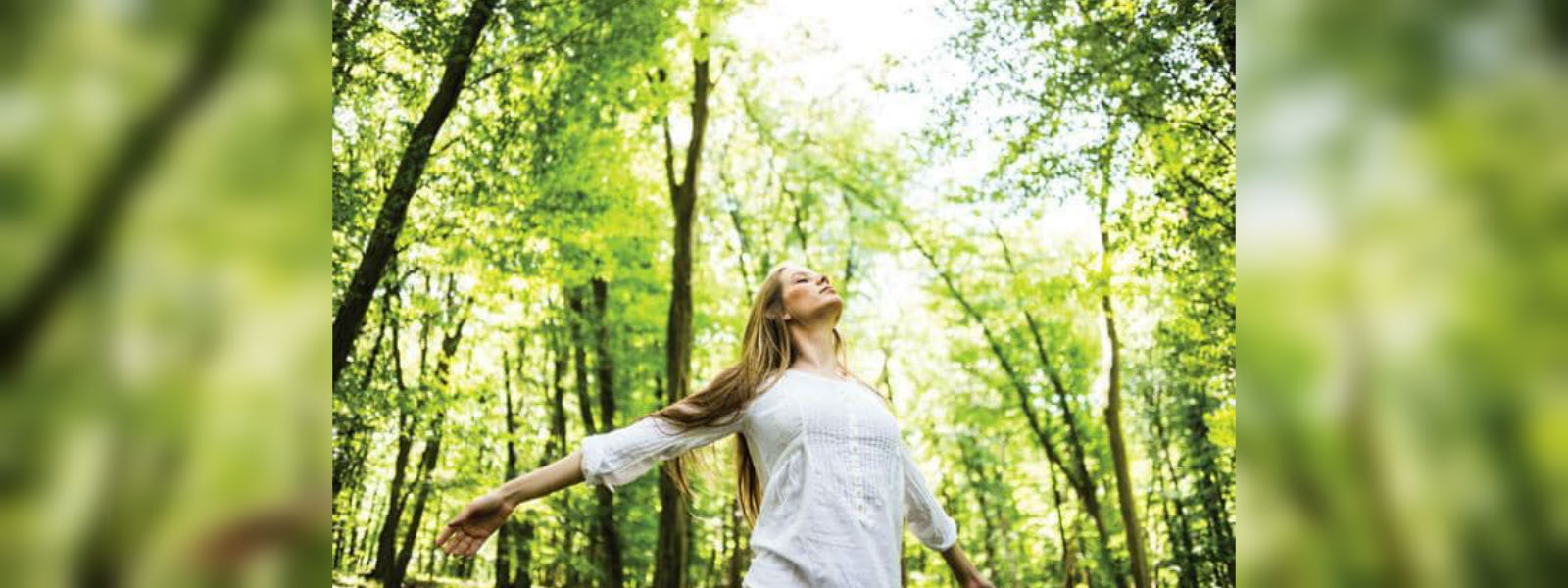.webp)

‘Forest bathing’ – the new health prescription with no side effects
COLOMBO (News 1st) - Under a canopy of dogwood trees at the National Arboretum in Washington, D.C., about 16 people stand barefoot on the cool grass, as a guide invites them to use their senses to contemplate the nature that surrounds them.
"Maybe smoosh up a leaf and see if you can smell what's present there," intones the guide, Clare Kelley. "Maybe if you're feeling really bold today you might even taste it," she suggests.
Kelley is a certified guide in 'forest bathing', the modern Japanese practice that seeks to improve mind and body health by immersing people in nature.
Shinrin-yoku, which translates to "taking in the forest", started in Japan in the 1980s but it's been finding its way into preventive health practices in the U.S.
Forest bathing is different from other experiences of being in nature, like a jog or a hike, in that it is meant to be undirected but also mindful. It focusses thoughts away from the inner monologue and guides the senses towards the immediate environment instead, like one's breath, the smells and sounds of the forest, or the breeze across one's skin.
"You can expose people to the patterns of trees and the specific frequency of the branching in nature and see that people have a relaxation response," says Dr. Paul Jarris, a veteran national health policy advisor who has been recognized for his contributions to American public health and who lectures to other medical doctors on the growing practice of forest bathing.
"You may not necessarily have exactly that same effect if you were to walk really fast on getting from point A to Point B on a hike," he adds.
Studies suggest simply being exposed to a natural and especially a forested setting for a time results in measurable health improvements, including lowering stress levels, reducing worry and rumination and boosting the immune system -- including the NK "natural killer" cells which detect and control early signs of cancer.
One small study in Japan showed that forest bathing for two nights resulted in a 50 percent increase in anti-cancer NK cells.
Scientists think antimicrobial chemicals released by trees called phytoncides, which prevent the plants from rotting, might also be responsible for the health benefits detected in humans.
For Clare Kelley, a Masters in public health who incorporates guided meditation into her walks, the benefits are intuitive.
"It really is coming back to our own nature as humans," she says.
Among the people on Kelley's guided walk is a busy middle-aged woman who only wants to be identified as Linda because she's going through a difficult personal life event. She says she became tearful while silently meditating under the trees when a voice in her head asked her 'why is it so hard to simply pause in your life'?
"I've been going nonstop from one thing to another. And when I paused, tears came, emotions came," Linda told Reuters.
"There is something about the forest and I just tried to open myself to it and let it hold me."
New York State singles out forest bathing as a "prescription with no negative side effects that's also free", according to its Department of Environmental Conservation website.
And in Washington, D.C., Dr. Robert Zarr, a former advisor to the National Park Service, developed a "Park Rx" program which encourages medical doctors to write 'park prescriptions' instructing patients to spend undirected time in nature.
Time spent in nature is something systems analyst Frank Messano never does. The burly 48-year-old from nearby Fairfax, Virginia, says he's going through a divorce and stays mostly in his basement.
But here he is barefoot on Kelley's guided forest bathing excursion, looking for "treasure" which he finds in the form of little purple flowers on the ground.
"I need more color in my life, I need more nature in my life," he says, twirling the lavender flowers in his fingers.
Jarris says federal and state governments, as well as the private sector, are looking at forest bathing and other so-called nature therapies, including in the housing sector, urban development, parks and recreation, even architecture.
"They really are converging on this healthful aspect of nature and the second part of that then is the practice of forest bathing," he says.
But he also cautions that medicine has a hard time studying "complicated systems" like a forest.
"The science is good, it's not perfect yet. We're still a long way from reaching a consensus," he says.
But for Messano, it is "irrelevant" if the science behind forest bathing actually backs up how good the walk made him feel that day.
"Does it matter if it's true or false?," he asks. "If it's helping me, that fantastic. It's like a bonus."
Other Articles
Featured News





.png )




-725921-795712_550x300.jpg)
-794738_550x300.jpg)






















.gif)